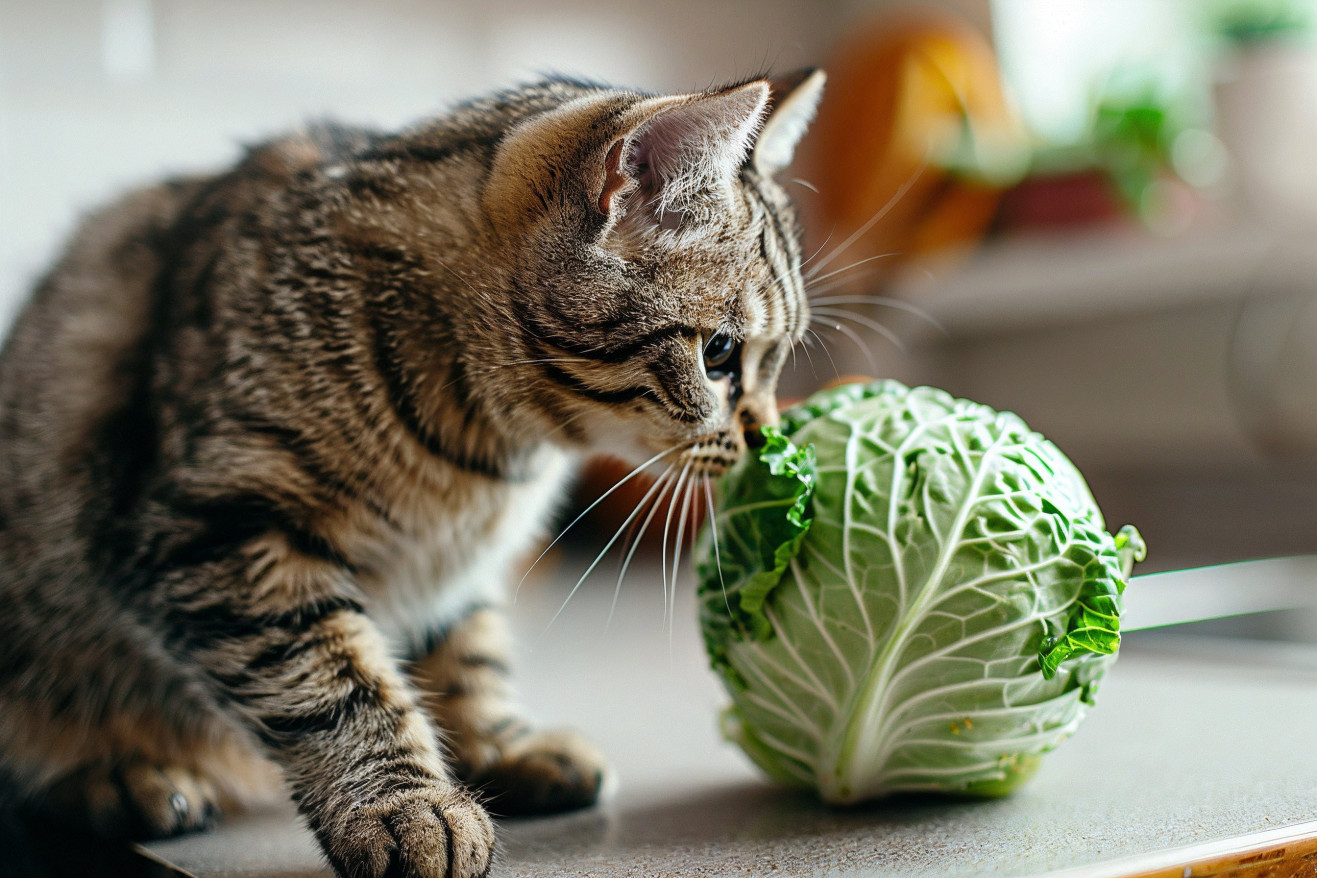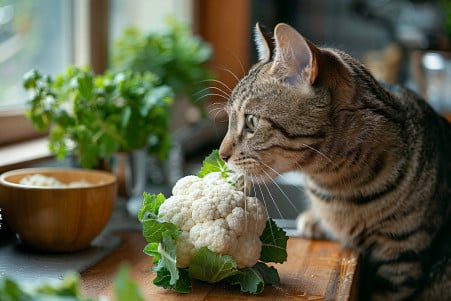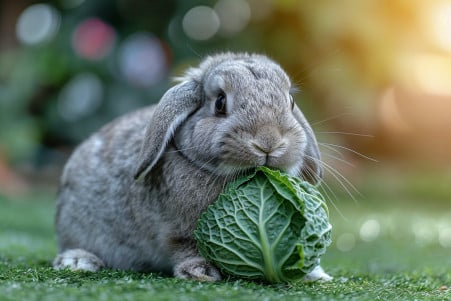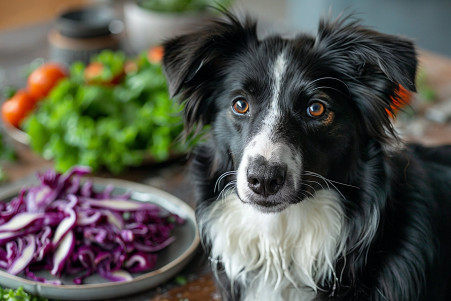Can Cats Eat Cabbage? What to Know About the Benefits and Risks
27 March 2024 • Updated 25 March 2024

If you're a cat owner, you may be curious about whether or not cats can eat cabbage. Cabbage can be good for cats in some ways, but it also has some potential downsides. For example, cooked cabbage can be a good source of fiber, vitamins, and minerals. However, cats can't process raw cabbage well, and eating too much cabbage can lead to gas, diarrhea, and goiters because of goitrogens.
In general, cats can eat cooked cabbage in moderation, but it should be only a small part of their diet.
This article will take an in-depth look at the scientific and nutritional evidence to find out if cats can eat cabbage. It will help you make the best choices for your cat's diet, whether or not you decide to include this cruciferous vegetable. It will also go into detail about portion control, preparation, potential side effects of eating too much cabbage, and which cats should avoid cabbage altogether.
Can cats eat cabbage?
Can Cats Eat Cabbage?
Cooked cabbage is generally safe and easier for cats to digest than raw cabbage. According to Animal Gator, raw cabbage can be hard for cats to digest and cause gastrointestinal upset because of its high fiber content and the presence of isothiocyanates, as mentioned in this article from Purina.
Cooking cabbage also reduces the levels of goitrogens like thiocyanates, which can, in large amounts over time, potentially suppress the thyroid gland, according to Spot Pet Insurance. However, as all of these sources note, even though cooked cabbage is generally easier for cats to digest, it's still important to introduce it slowly and in small amounts to prevent digestive upset.
In addition, some cats may be allergic to compounds in cabbage, although the risk is low, according to Purina. Therefore, it's important to watch your cat closely for signs of an allergic reaction, such as vomiting or diarrhea, when you first feed them cooked cabbage. If you do this, cooked cabbage can be an occasional part of most cats' diets.
Cabbage Leaves vs. Whole Heads: Is There a Difference?
Both the leaves and the whole head of cabbage are safe for cats to consume in moderation, as long as they are properly cooked. Spot Pet Insurance recommends a serving size of 1-2 teaspoons of cooked, shredded cabbage or one boiled/steamed cabbage leaf every other week. The key is to always serve cabbage plain, without any added seasonings or oils, as these can be harmful to cats.
It's important to introduce cabbage gradually to a cat's diet, regardless of whether you're feeding them leaves or the whole head. Spot Pet Insurance cautions that large amounts of cabbage, whether leaves or whole heads, can potentially suppress a cat's thyroid gland due to the presence of goitrogens. So moderation is crucial when incorporating this vegetable into a feline's diet.
Cooked Cabbage Can Offer Some Health Benefits for Cats
Although it isn't a required part of a cat's diet, cooked cabbage can offer some health benefits if it's given in moderation. According to WagWalking, cabbage is low in carbs and can be a good source of fiber for cats, which can help with digestion. The article also explains that cabbage has vitamins and minerals like vitamin C, vitamin K, and potassium, which can help cats stay healthy.
Furthermore, the anti-inflammatory properties of cabbage can help with inflammation in cats, including inflammation caused by arthritis and skin conditions. That said, it's important to remember that these benefits are relatively small, and cats still need a balanced diet that includes meat, as the study points out.
How Much and How Often Should You Give Your Cat Cabbage?
According to Preventive Vet, the recommended amount for cats is 1 to 2 teaspoons of cooked, shredded cabbage per week, or one boiled/steamed cabbage leaf every 1-2 weeks. The article also warns that cabbage should never be given to cats daily because it can cause digestive problems and may even cause the thyroid to stop functioning properly.
If you're adding cabbage to your cat's diet, WagWalking recommends starting with small amounts and gradually increasing the serving size while watching for any negative side effects. Cabbage should be used as a treat or supplement, not a substitute for your cat's regular, nutritionally balanced diet.
To get the most accurate serving size recommendations for your cat based on their size, age, and health status, it's a good idea to talk to your vet. They can give you personalized advice. However, if you follow these general recommendations and give your cat cabbage in moderation, you can feel comfortable giving this vegetable to your cat as a special treat.
How to Feed Cabbage to Your Cat: Tips and Precautions
If you decide to feed your cat cabbage, make sure to introduce it slowly and in small amounts to prevent digestive problems. Animal Gator recommends cooking cabbage thoroughly before giving it to your cat since raw cabbage can be hard for cats to digest. In addition, Cats.com warns against adding seasonings, oils, or other ingredients to the cabbage, which can be toxic to cats.
Make sure to keep a close eye on your cat for any signs of an allergic reaction or digestive upset after you give them cabbage. If you're worried about feeding your cat cabbage or your cat has any medical issues, Preventive Vet recommends talking to your vet to get their advice, especially since they can provide personalized recommendations based on your cat's specific needs.
Cats Should Only Eat Cabbage in Moderation
Although cabbage is not toxic to cats, it should only be given in moderation as an occasional treat due to its potential to cause digestive issues and suppress the thyroid gland. Hepper points out that cats are obligate carnivores and need a diet that is primarily meat-based, so the benefits of cabbage are not as useful to them.
Cooked cabbage is generally safer for cats than raw cabbage, since Catster explains that raw cabbage is hard for cats to chew and digest and contains compounds that can suppress the thyroid. However, it's still important to introduce cooked cabbage gradually and watch for any negative reactions.
Cabbage should never be used to replace a cat's regular, balanced diet, which should be made up primarily of high-quality, meat-based cat food. WagWalking suggests a portion size of 1-2 teaspoons of cooked, shredded cabbage once a week or one boiled/steamed leaf every 1-2 weeks. If you decide to give your cat cabbage, make sure to stick to these portion and frequency recommendations and talk to your vet if you have any concerns.
Final Thoughts: Weighing the Benefits and Risks of Cats Eating Cabbage
Although cabbage is not toxic to cats, it should only be given in moderation as an occasional treat due to its potential to cause digestive issues and suppress the thyroid gland. While cooked cabbage is generally safer for cats than raw cabbage, it should still be given in moderation and never used to replace a cat's regular, balanced diet, which should be made up primarily of high-quality, meat-based cat food.
If you decide to give your cat cabbage, make sure to stick to the recommended portion sizes and frequency guidelines and talk to your vet if you have any concerns. While cabbage may offer some potential health benefits, it's not a necessary part of a cat's diet, and it should be given in moderation.


